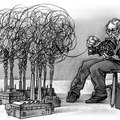 | |
POOR Jeff Immelt. Since taking control of General Electric (GE) in 2001, he has hardly put a foot wrong. He has reshuffled his pack of companies, divesting volatile ones and acquiring fast-growing businesses in higher-margin areas such as infrastructure and health care. Recent revenue growth has been zippy, in line with the company's target of two to three times global GDP growth. GE is forecasting profits of close to $23 billion this year, which would be double-digit growth over last year. Most analysts recommend the firm's shares.
But investors have shrugged. GE's share price has risen by 9.6% over the past 12 months, well below the S&P 500's 20% gain. Yet the share price of Siemens, its European rival, has jumped 39% during the same period, despite a corruption scandal (see chart). Mr Immelt's latest deal, the sale for $11.6 billion of GE's plastics unit to SABIC of Saudi Arabia, had little effect when it was announced on May 21st.
Why the subdued performance? The “I love Jack” premium baked into the share price under Mr Immelt's celebrated predecessor, Jack Welch, has long gone. It is harder to turbo-charge the shares of a firm that is already performing well. The benefits of diversification look less compelling when markets are buoyant. And GE's size means it has not benefited from the takeover speculation that has lifted other firms' share prices.
Some believe that GE would be more valuable if it broke itself up, or at least became more focused. Last month analysts at Citigroup proposed that it ought to spin off three big assets: NBC Universal, its media unit; its consumer-finance arm; and its property business. That would leave behind a simpler firm with a sharper focus on infrastructure, where Mr Immelt has assembled a powerful array of businesses to address the long-term needs of developing economies.
For the moment, GE is sticking to its many guns. Its ability to develop talented managers and run businesses well is not in question. It is unsentimental about getting rid of assets if their performance is not up to scratch—both Mr Immelt and Mr Welch once worked in the plastics unit. And it is keeping shareholders sweet with steadily rising dividends and a share-buyback programme.
But today's frantic dealmaking means conglomerates such as GE find it harder to argue that they are worth more than the sum of their parts. GE's plastics unit fetched over $1 billion more than the highest estimate of its value. Mr Immelt got an excellent price—but it rather awkwardly suggests that GE might be worth far more if it were broken up.




